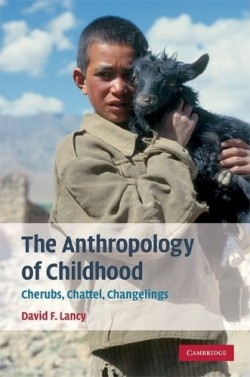The Anthropology of Childhood
Cherubs, Chattel, Changelings
“Images of badly abused slave children in Ivory Coast harvesting the cocoa beans that will be processed into the chocolates consumed by obese children in Los Angeles” will haunt the thoughts of everyone who reads this well-documented and deeply disturbing study of the disparate meanings of childhood around the world. Infanticide, child sacrifice, backbreaking labor, and child abuse have characterized human history, and even today, unwanted children remain on the margins of society in many third world countries.
This book is a must-read for anyone who cares about the role children play in the international network of sweatshops, slavery, and prostitution. The meaning of childhood, as most Americans understand it, is radically at odds with the meaning of childhood on other continents. Whereas most third-world societies are “gerontocracies” that prioritize the needs of adults over those of children, ours is a “neontocracy” that puts the needs and desires of children first. We generally don’t perceive our children as laborers who will contribute financially to the family unit; instead our primary expectation of our children is that they gratify us emotionally.
Our privileged “cherubs” live in environments that are drastically different from those of most of the world’s children, or “chattel,” who are routinely put to work at age three or four, beaten, starved, and sold into slavery or prostitution for the financial gain of their parents. They die from diseases that are cheap and simple to prevent, and are increasingly orphaned by AIDS or put out on the street by overburdened relatives. Even in the best of conditions, they may be forcibly weaned and rejected by their mothers, who need to ration their own caloric and energy needs, especially if they are pregnant again.
Author David F. Lancy includes a comprehensive history of abortion, abortifacients, and infanticide that demonstrate, among other important claims, that girl babies have historically been more at risk for such treatment because sons are treasured as status symbols and are seen generally as more valuable than daughters, who are financial burdens. Traditional methods of infanticide include smothering, exposure to the elements, abandonment, and even live burials. Today, girls who are kept alive are routinely forced into early marriages or sold into prostitution, with the expectation that they will send a portion of their earnings home to their parents.
David K. Lancy is a professor of anthropology at Utah State University. His lucid, engaging prose makes this book hard to put down, and it will be as accessible to laypeople as to professionals and academics. Lancy’s other books are Playing on the Mother Ground and Children’s Emergent Literacy.
Disclosure: This article is not an endorsement, but a review. The publisher of this book provided free copies of the book to have their book reviewed by a professional reviewer. No fee was paid by the publisher for this review. Foreword Reviews only recommends books that we love. Foreword Magazine, Inc. is disclosing this in accordance with the Federal Trade Commission’s 16 CFR, Part 255.

